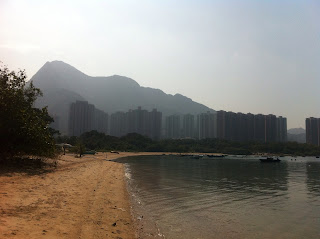To read my post in context please visit my blog Three Torches
It’s been a hard day at work, and you’ve been putting in overtime hours for the past two weeks at the investment bank. Your two kids – the older son applying for college, with his younger sister sitting her entrance exams into secondary school – are stressed out. Your spouse has been pushing hard for promotion lately, but can’t quite seem to figure out what the boss really wants.
At the very least you can come home to a suburban area that’s a good distance away from the hustle and bustle of the heart of Hong Kong island – places like Central, Causeway Bay, or TST. A home in a residential area that has a handful of medium-sized malls built more for convenience rather than to attract tourists. There’s a fantastic and well-maintained country park that’s perfect for walks and exercise, and the quiet beach area sees more than hundreds of people every day swimming, fishing, flying kites, or chasing crabs in the rocks.
Could there be a worse thing than turning this peaceful landscape into ten or twenty apartment buildings with parking lots and 60+ floors and additional shopping malls to support new residents?
What would it be like for a resident of 2 or 3+ decades in this area to think that in perhaps five or ten years, opening a window in the morning will no longer invite the salty smell of seawater and the ocean, but instead roaring cranes and the stench of engine fuel and chemical constituents? Instead of the rich diversity of animal life that have made their livelihoods for generations in the beach and bay area, there will be temporary construction houses and lines of machinery and vehicles moving in an out hundreds of times a day?
When the water is warm enough to swim in, each morning at the crack of dawn sees as many as fifty to a hundred residents swimming in the waters near the beach. They walk over from their buildings along the sleepy streets with few cars and pedestrians, follow the pathway that leads from the shore along the back of the beach to the Wu Kai Sha Pier. Sandals, towels, bottles of water, and dry clean clothes are all placed along the railings of the pier, before they climb down the stairs straight into the seawater. The vast majority of these swimmers are in their sixties or seventies. They sport their wet graying locks of hair with pride, at times chattering loudly about the fact that they’re the only ones with the capacity of waking up before 6am to enjoy a wonderful morning swim. Many of them swim for half an hour to forty minutes.
This area that is the potential site for new housing plans and land reclamation represents the one area in this residential suburbia where kids, adults, domestic maids, and elderly can all directly interact with nature. After around four in the afternoon the beach becomes populated with students, all in their individual school uniforms, who are eager to kick off their shoes and run in the finer sand patches. The beach is mostly rocky with many pebbles and small boulders overrun with barnacle shells: here is where the area is so full of life, containing thriving ecosystems of crabs, fish, tiny eels, and many more that remain unseen to the human eye.
It seems interesting that Hong Kong residents spend a lot of money each year traveling to see the sights of greater East Asia and the world. Many leave Hong Kong for a week or two in order to escape the massive consumer mania and material urges, hiking in the mountains of Japan to riding elephants in Thailand to white water rafting in Australia. The enjoyment of these natural locations is crucial to the renewal of the businessman, the school teacher, the stock trader, the social worker, the grocer, the domestic maid, the student, the family. So why go about with the destruction of these beautiful habitats at home in exchange for more residential outlets? Why compromise the integrity of Hong Kong’s other side, its precious natural body and habitats?
Jonathan Lin is a junior English major currently studying in Carleton College, Minnesota, USA. On his personal blog Three Torches he discusses international affairs and world events.









